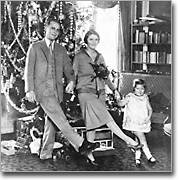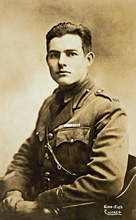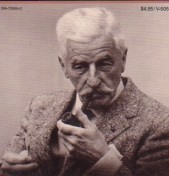|
● Early
Fiction
● Transcendentalists
● Power
of Imagination
● New
Visions of America
● Reform
and Liberation
● Regionalism
● A
New Wave
● Sympathetic
Views
● Rebellious Spirit
● The
Modernists
● The Lost Generation
● Harlem Renaissance
● New
Drama
● Depression,
Realism and Escapism
● Postwar Voices
and the "Beat Generation"
● New American
Voices
The Lost Generation
 |
|
The Fitzgerald's
Family
|
 In
the aftermath
of World War I many novelists produced a literature of disillusionment.
Some lived abroad and were known as "the
Lost Generation." F.
Scott Fitzgerald's novels captured the restless, pleasure-hungry,
defiant mood of the 1920s. Fitzgerald's great theme, expressed poignantly
in The Great Gatsby, was of youth's golden dreams turning
to disappointment. His prose was exquisite,
yet his vision was essentially melancholy
and nostalgic. In
the aftermath
of World War I many novelists produced a literature of disillusionment.
Some lived abroad and were known as "the
Lost Generation." F.
Scott Fitzgerald's novels captured the restless, pleasure-hungry,
defiant mood of the 1920s. Fitzgerald's great theme, expressed poignantly
in The Great Gatsby, was of youth's golden dreams turning
to disappointment. His prose was exquisite,
yet his vision was essentially melancholy
and nostalgic.
 |
|
Young Hemingway
|
 War
had also affected Ernest
Hemingway Having seen violence and death close at hand,
Hemingway adopted a moral
code exalting
simple survival and the basic values of strength, courage and honesty.
In his own writing, he cut out all unnecessary words and complex
sentence structure, concentrating on concrete objects and actions.
His main characters were usually tough, silent men, good at sports
or war but awkward in their dealings with women. Among his best
books were The Sun Also Rises (1926), A Farewell to Arms
(1929) and For Whom the Bell Tolls (1940). He eventually
won the Nobel Prize and is considered one of the greatest American
writers. War
had also affected Ernest
Hemingway Having seen violence and death close at hand,
Hemingway adopted a moral
code exalting
simple survival and the basic values of strength, courage and honesty.
In his own writing, he cut out all unnecessary words and complex
sentence structure, concentrating on concrete objects and actions.
His main characters were usually tough, silent men, good at sports
or war but awkward in their dealings with women. Among his best
books were The Sun Also Rises (1926), A Farewell to Arms
(1929) and For Whom the Bell Tolls (1940). He eventually
won the Nobel Prize and is considered one of the greatest American
writers.
 |
|
William Faulkner
|
 A
Southerner, William
Faulkner, found in one small imaginary corner of the state
of Mississippi, deep in the heart of the South, enough material
for a lifetime of writing. His social portraits were realistic,
yet his prose style was experimental. To
show the relationship of the past and the present, he sometimes
jumbled the time sequence of his plots; to reveal a character's
primitive impulses and social prejudices, he recorded and edited
the rambling of his or her consciousness. Some of his
best novels are The Sound and the Fury (1929) , Light
in August (1932). Absalom, Absalom! (1936). Faulkner,
too, was a Nobel Prize winner. A
Southerner, William
Faulkner, found in one small imaginary corner of the state
of Mississippi, deep in the heart of the South, enough material
for a lifetime of writing. His social portraits were realistic,
yet his prose style was experimental. To
show the relationship of the past and the present, he sometimes
jumbled the time sequence of his plots; to reveal a character's
primitive impulses and social prejudices, he recorded and edited
the rambling of his or her consciousness. Some of his
best novels are The Sound and the Fury (1929) , Light
in August (1932). Absalom, Absalom! (1936). Faulkner,
too, was a Nobel Prize winner.
Previous Page Next
Page
|

